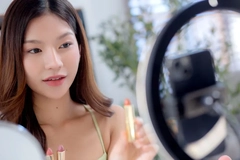Haut.AI releases skin care recommendations chatbot to “help brands find their voice”
Key takeaways
- Skin.Chat gives consumers science-backed skin care advice and product recommendations.
- The platform gives brands insights to refine strategies and close portfolio gaps.
- The chatbot boosts customer conversions and loyalty while keeping brand voices consistent across channels.

Haut.AI has launched an AI-powered skin care consultant that helps brands capture first-party consumer insights, close product and strategy gaps, and boost e-commerce performance. The scientifically-backed chatbot guides shoppers with tailored skin care advice.
As companies increasingly operate via online or third-party retailers, closing the gap between brands and their consumers enables businesses to reconnect with their audience and optimize their operations.
“Skin.Chat is a conversational AI for choosing and shopping for skin care products. You can think of it as an interactive chat…you can instantly go in and ask any questions related to skin care,” Anastasia Georgievskaya, co-founder of Haut.AI, tells Personal Care Insights.
“The chat instantly digs into the knowledge base that Haut.AI has carefully collected to bring up the best, most relevant, scientifically validated answers.”

Moreover, the tool can add items directly to a user’s online shopping cart within a single conversation and is connected to location-specific product inventories.
“Let’s say you are looking for a light moisturizer for acne-prone skin, and you’re currently based in Los Angeles, US. It will dig into this knowledge base and develop the best selections. Then you can refine it further and ask more questions about ingredients, the price, and so on,” Georgievskaya explains.
“Some of the LLM models don’t deliver that level of precision, or you have to prompt them a lot until you get a relevant result.”
Refining audience, closing gaps
Skin.Chat can help brands gather data about their customer base to improve its product offerings and market strategies.
“A lot of brands sell through retail partners, and by doing so, they essentially lose connection to the customer. They don’t know who they really are. Using Skin.Chat, you can collect first-party data about consumer sentiment toward your products, ” she says.
“Do consumers have trust in your product? How do they react to different suggestions? Did they express that they like some products more than others?”
These insights can help brands identify gaps in their product offerings and track down their target audience.
“Essentially, the first thing you can do is understand if your portfolio adequately addresses the concerns and demands of your current customer base. What if they’re looking at specific ingredients and your portfolio doesn’t have products with those ingredients? Then you can make a decision,” Georgievskaya says.
“Maybe you are targeting the wrong audience? Your marketing strategy might need to shift in customer acquisition. How can you attract more customers within your ideal customer profile?”
.jpg) The AI allows brands to get customer insights, refine strategies, and close portfolio gaps.She says AI will help brands target their customers better with personalized marketing strategies.
The AI allows brands to get customer insights, refine strategies, and close portfolio gaps.She says AI will help brands target their customers better with personalized marketing strategies.
“Stop sending me 10 irrelevant emails that I never read. Give me three emails that are personalized for me, based on my interests, based on celebrities I love, based on the product we’ve been chatting about.”
“It will help brands find their voice and connect better with customers because they will drop a lot of unnecessary fluff and actually focus on what the consumer cares about most.”
Early experiments have shown that Skin.Chat helped drive higher conversions and higher average order values.
“We also see good results with the satisfaction of customers from these conversations. I think customers will appreciate an opportunity to talk with a brand directly on their website, as opposed to trying to get answers from ChatGPT — not that it’s a bad tool. Still, brands have more expertise and more insights,” Georgievskaya tells us.
Lack of access means unmet needs
Skin.Chat aims to fill a knowledge gap in the beauty industry. According to Georgievskaya, there is a high turnover rate of employees in beauty retail, prestige, and spas. This makes it difficult for brands to maintain proper training of their staff or ambassadors on products, ingredients, and skin care science — especially at the rate of new innovations.
“Even if you are a very talented, very trained dermatology expert, you are not necessarily an expert in the new line that you are starting to work with, the new brand you are starting to represent,” she says.
In this way, Skin.Chat is also a tool for brands to have a consistent brand voice that is coherent and cohesive across different sales channels and touchpoints with the consumer.
“It’s amazing if you have the privilege of consulting with a dermatologist or even a licensed aesthetician. Unfortunately, it’s quite often not the case,” Georgievskaya adds.
“So consumers have to fight. They’re trying to find knowledge on their own. Sometimes they fail. It’s very hard to navigate this.”
Personal Care Insights previously reported on findings that there are 34 dermatologists per one million residents in the US, and in Europe, there are 50 per one million.
We spoke to Esther Freeman, Global Health Dermatology at Massachusetts General Hospital and associate professor at Harvard Medical School, US, who told us: “Even high-resource countries such as Australia, North America, or Europe have what I call ‘dermatology deserts,’ including rural or remote areas that are underserved.”
.jpg) Skin.Chat gives consumers science-backed skin care advice and product recommendations.Driving demands for chatbots
Skin.Chat gives consumers science-backed skin care advice and product recommendations.Driving demands for chatbots
The beauty industry is in an age of innovation, with an abundance of product lines, launches, debuting companies, and expanding portfolios. This has created a need for tools that offer validation and support in selecting products and provide claims in a streamlined way.
Georgievskaya explains that consumers increasingly embrace the concept of “skinimalism,” which makes selecting fewer products, despite the saturated market, more difficult.
“We want to have three to four products to make the routine very simple, but at the same time, very actionable and very effective. That’s why consumers want to have tools that help narrow down the best choices.”
She adds that the widespread availability of LLMs has introduced a consumer pattern where information is valued more if it is understandable, explainable, fast, and efficient.
“We no longer want quizzes, we no longer want to read long product descriptions, or only watch influencer marketing. We actually want to discover it on our own, on our terms.”
Fishing for facts?
AI chatbots are trained on large data sets to help them create answers. Some are also trained through user exchanges, in which the bot gathers data from replies and interactions during the conversation.
This raises concerns, as personal or private information shared with the bot in confidence could be stored in its database and made available in other conversations with other users.
Georgievskaya explains that Skin.Chat is not trained on a user’s data but does store information to help it retain its memory. For example, the bot can remember a user’s skin concerns from six months ago, allowing participants to pick up the conversation where they left off without reintroducing themselves and their concerns.
Moreover, LLMs have increasingly been found to engage in “chatbait.” The term refers to a phenomenon where chatbots ask more questions than might be necessary to fulfill their intended purpose.
“The AI system should have guardrails that prevent oversharing of private information. So, for example, in our case, we are making sure that it does not intentionally try to learn things that are not necessary to provide skin care consultation or skin care conversations,” Georgievskaya concludes.













